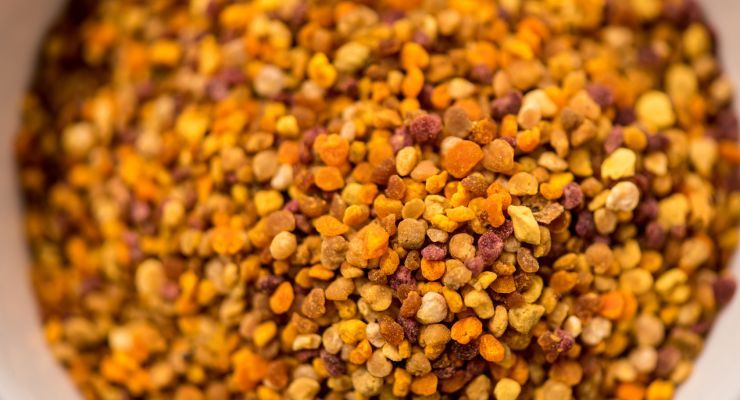You may have heard a lot about bee pollen, but perhaps you are not quite sure about what it is and what it can do for you. Bee pollen sets the mark for all other superfoods. It contains over thousands of different enzymes – more than any other food in nature.
Just 35 grams of bee pollen per day provides all of the nutritional needs of an “average” person. What a testimony to its nutritional potency.
When bees visit a flower for nectar, they gather millions of tiny pieces of pollen on their hairy body. They scrape these pieces together along with a little nectar and some digestive juices to form a small ball. This ball is what we call bee pollen and contains millions upon millions of individual pieces of pollen. The bees carry the pollen back to the hive in small sacks on the back of their legs. Once they arrive back at the hive, they deposit the pollen for the queen to eat and feed to her brood. There is a tremendous amount of life energy in each piece of bee pollen – enough to sustain the queen for a long time as she lays 2000 eggs per day.
What is in pollen?
Bee pollen contains over 5000 different types of enzymes. This is more enzymes than have ever been discovered in any other food type. Bee pollen is about 40% protein. In fact, it is seven times more protein than in most meet per weight. The best thing about the protein in bee pollen is that it is already partially digested which makes it very easy to absorb, unlike meat. Meat sits for a very long time in the gut – almost 4-5 hours before it is broken down.
Besides being a complete source of protein, bee pollen is also loaded with B vitamins, vitamins A, C, D and E. Bee pollen is the only plant source that contains vitamin B-12.
It also offers simple and complex sugars, fats and a high amount of lecithin along with trace minerals.
Benefits of bee pollen
The health benefits attributed to bee pollen are endless.
Enzymes: First and foremost, it is an incredible source of enzymes. As we age, if we stress or are sick, our enzyme army becomes depleted. Consuming bee pollen on a daily basis helps to replenish our enzyme stores.
Anti-inflammatory: Bee pollen is a potent anti-inflammatory. Recent research reveals that properties within bee pollen are capable of preventing or reducing symptoms in many inflammatory conditions such as arthritis, cancer and heart disease.
Allergies: Bee pollen has been shown to be an effective remedy for seasonal allergies. Allergists believe it can help lower sensitivity to local plant pollens, which can ease the effects of hay fever and other allergic reactions. Dr. Leo Conway, M.D. reported that after treating his patients with bee pollen, 94 percent were free of allergy symptoms, including everything from asthma to sinus problems.
Digestion: Bee pollen is loaded with essential nutrients and enzymes that help ease digestion and tackle many of the symptoms of gastric conditions such as irritable bowel and gastritis.
Weight
Consuming bee pollen has also been reported to reduce cravings as well as to stimulate metabolic processes, which means you’ll not only burn more calories, you’ll be less likely to overeat. Its phenylalanine content, which is a natural amino acid the body requires, acts as an appetite suppressant.
Immune system booster: Bee pollen is also thought to have a significant impact on the immune system due to its vitamin B, C, D and E content as well as calcium, magnesium, selenium, cysteine, and a variety of proteins. As it’s good for intestinal flora, this further boosts the immune system. Its antibiotic-like properties also help to protect the body from contracting infectious diseases like the cold and flu.
Energy: Consuming bee pollen on a daily basis will give you a good and steady source of energy. If you plan to take a long hike or participate in an enduring physical activity, be sure to take some bee pollen with you.
How to enjoy bee pollen
The one thing you don’t want to do is heat bee pollen, enjoy it fresh. Sprinkle some on yogurt, salad, rice or add to your favorite smoothie. If you have not consumed bee pollen before, start with a little – a few granules, to be sure you don’t have an allergy ( although rare). After that gradually increase your amount until you are consuming about 3 tablespoons a day.
Sourcing and storing
Be sure to source your bee pollen from a local hive and one that has harvested ethically. Many people who harvest bee pollen take too much and leave the hive starving, only to replace it with sugar. Be sure that this is not the case with your source.
Store bee pollen in the freezer for best results. It will not freeze and can be eaten directly from the freezer.
Bee pollen is a wonderful gift that should be respected and enjoyed.
-Susan Patterson

